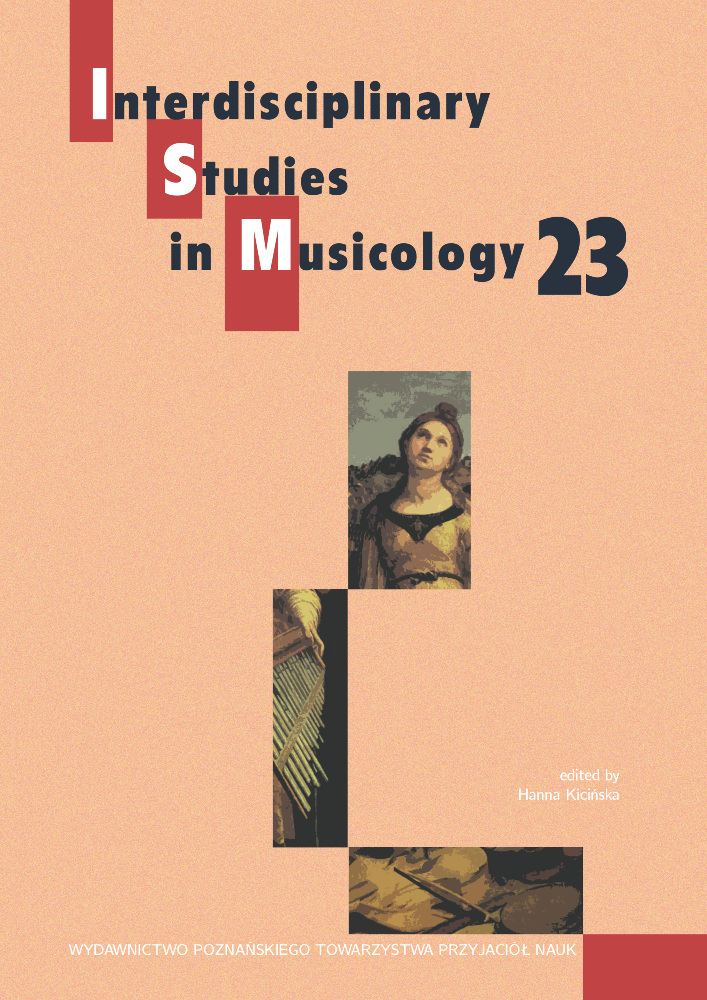Abstrakt
The narratives of Alban Berg’s two operas, Wozzeck and Lulu, have often been analyzed for their socio-cultural symbolisms as reflections of the artistic movements in which they were composed. However, the operas also display a myriad of complex interpersonal relationships between the characters that bear explicit associations with themes of power. Michel Foucault famously devised several theories on power, through which this article aims to filter Berg’s operatic narratives in order to draw unique parallels between social theory and artistic expression. What emerges is an interdisciplinary study that expands the understanding of these works through this unique juxtaposition, yielding new interpretations of these characters’ interactions through the applicable theories of Foucault’s force relations.
Bibliografia
Berg, A. (2014). Lecture on Wozzeck: The ‘Atonal Opera. In B. R. Simms (Ed.). Pro Mundo—Pro Domo: The Writings of Alban Berg, (pp. 228–260). Oxford: Oxford University Press. DOI: https://doi.org/10.1093/acprof:osobl/9780199764068.003.0017
Berg, A. (1978). Lulu: Opera in 3 acts (7 scenes) after “Erdgeist” and “Büchse Der Pandora” by Frank Wedekind, English/German Libretto, (A. Jacobs, Transl.). Vienna: Universal Edition.
Berg, A. (1952). Wozzeck: Opera in 3 acts (15 scenes) Opus 7 after Georg Büchner, English/German Libretto, (E. Blackall & V. Harford, Transl.). Vienna: Universal Edition.
Cordingly, J. (2015). The Paranoid (Schizoid) Personality: Wozzeck and Grimes. In C. Seymour (Ed.). Disordered Heroes in Opera: A Psychiatric Report, (pp. 63–86). London: Plumbago Books. DOI: https://doi.org/10.1515/9780993377419-006
Follet, D. (2000). Mélisande Meets Lulu: Operatic Heroines from the Feminine Perspective. IAWN Journal, 6(3): 1–6.
Forneberg, E. (1959). Das Volkslied als expressionistisches Symbol in Alban Bergs ‘Wozzeck’. Neue Zeitschrift für Musik, 120: 261–65.
Foucault, M. (1994). The Ethics of Care for the Self as the Practice of Freedom. In J. Bernauer & D. Rasmussen (Eds.). The Final Foucault, (pp. 1–20). Cambridge, MA: MIT Press.
Foucault, M. (2020). The History of Sexuality, Volume I: The Will to Knowledge (R. Hurley, Transl.). London: Penguin Classics.
Ganz, A. (1987). Transformations of the Child Temptress: Mélisande, Salomé, Lulu. Opera Quarterly, 5(4): 12–20. DOI: https://doi.org/10.1093/oq/5.4.12
Greene, S. (1985). Wozzeck and Marie: Outcasts in Search of an Honest Morality. Opera Quarterly, 3(3): 75–86. DOI: https://doi.org/10.1093/oq/3.3.75
Jarman, D. (1991). Cambridge Opera Handbooks: Alban Berg, Lulu. Cambridge: Cambridge University Press.
Keldysch, J. (1965). Alban Bergs ‘Wozzeck’ und der musikalische Expressionismus. Sowjetwissenschaft: Kunst und Literatur, 13: 746–60.
Lockhead, J. (1997). Lulu’s Feminine Performance. In A. Pople (Ed.). The Cambridge Companion to Berg, (pp. 227–246). Cambridge: Cambridge University Press. DOI: https://doi.org/10.1017/CCOL9780521563741.014
Lynch, R. A. (2014). Foucault’s Theory of Power. In D. Taylor (Ed.). Michel Foucault: Key Concepts, (pp. 13–26). London: Routledge. DOI: https://doi.org/10.1017/UPO9781844654734.002
Mauser, S. (1981). Arnold Schönbergs ‘Erwartung’ und Alban Bergs ‘Wozzeck’: Studie zur Entwicklungsgeschichte des expressionistischen Musiktheaters. In R. Klein (Ed.). Alban Berg Symposion Wien 1980: Tagungsbericht. Alban Berg Studien 2, (pp. 91–96). Vienna: Universal Edition.
Morris, M. (1995). Admiring the Countess Geschwitz. In C. E. Blackmer & P. J. Smith (Eds.). En travesti: Women, Gender Subversion, Opera, (pp. 348–70). New York: Columbia University Press.
Pegley, K. (1998). Femme Fatale and Lesbian Representations in Alban Berg’s Lulu. In S. Bruhn (Ed.). Encrypted Messages in Alban Berg’s Music, (pp. 249–277). New York: Garland Publishing.
Perle, G. (1980). The Operas of Alban Berg, Volume 1: Wozzeck. Berkeley: University of California Press.
Perle, G. (1985). The Operas of Alban Berg, Volume 2: Lulu. Berkeley: University of California Press.
Platt, H. (1998). A Jungian Analysis of Berg’s Alwa. In S. Bruhn (Ed.). Encrypted Messages in Alban Berg’s Operas, (pp. 279–303). New York: Garland Publishing.
Rouse, J. (2003). Power/Knowledge. In G. Gutting (Ed.). The Cambridge Companion to Foucault, (pp. 95–122). Cambridge: Cambridge University Press. DOI: https://doi.org/10.1017/CCOL0521840821.005
Taylor-Jay, C. (1998). Towards a Feminist Reading of Berg’s Lulu: A Woman’s Place in a Man’s Opera. In S. Fragner, et al. (Eds.). Gender Studies & Musik: Geschlechterrollen und ihre Bedeutung für die Musikwissenschaft, (pp. 161–171). Regensburg: ConBrio.
Wartenberg, T. E. (1990). The Forms of Power: From Domination to Transformation. Philadelphia: Temple University Press.
Licencja
Prawa autorskie (c) 2023 Vanja Ljubibratic

Utwór dostępny jest na licencji Creative Commons Uznanie autorstwa – Bez utworów zależnych 4.0 Międzynarodowe.

